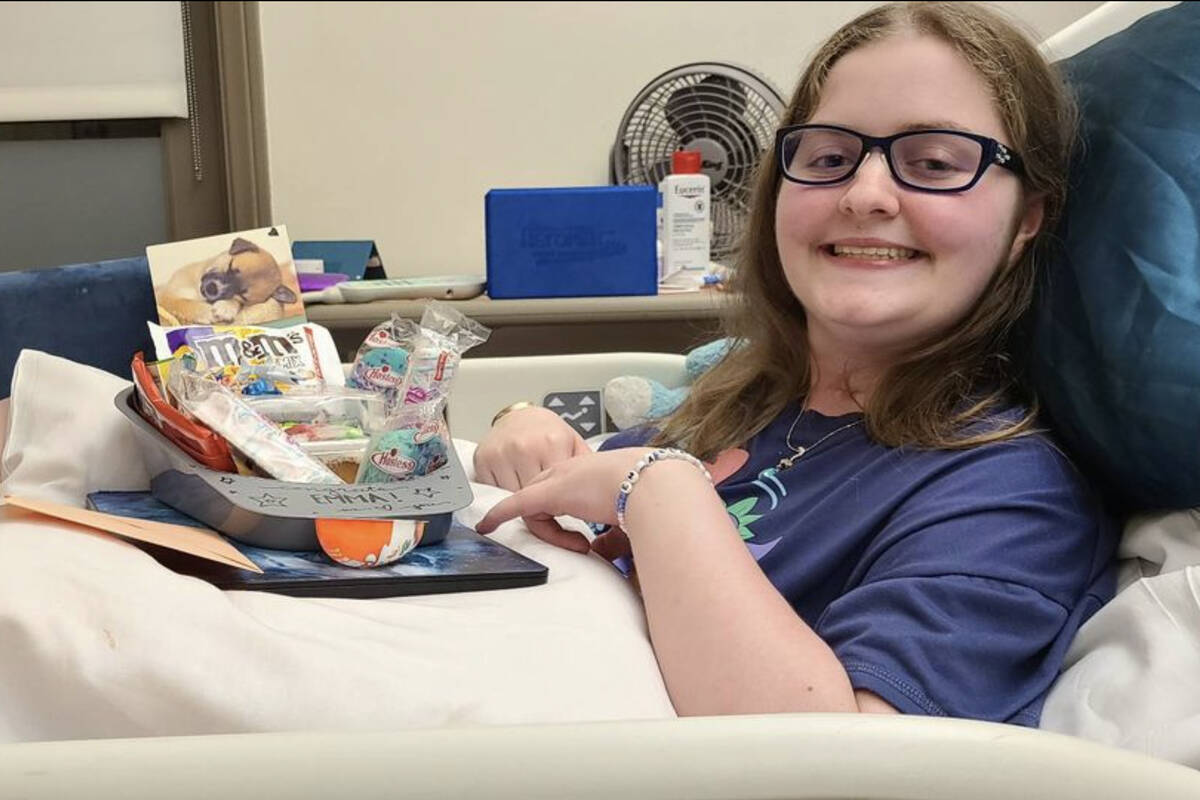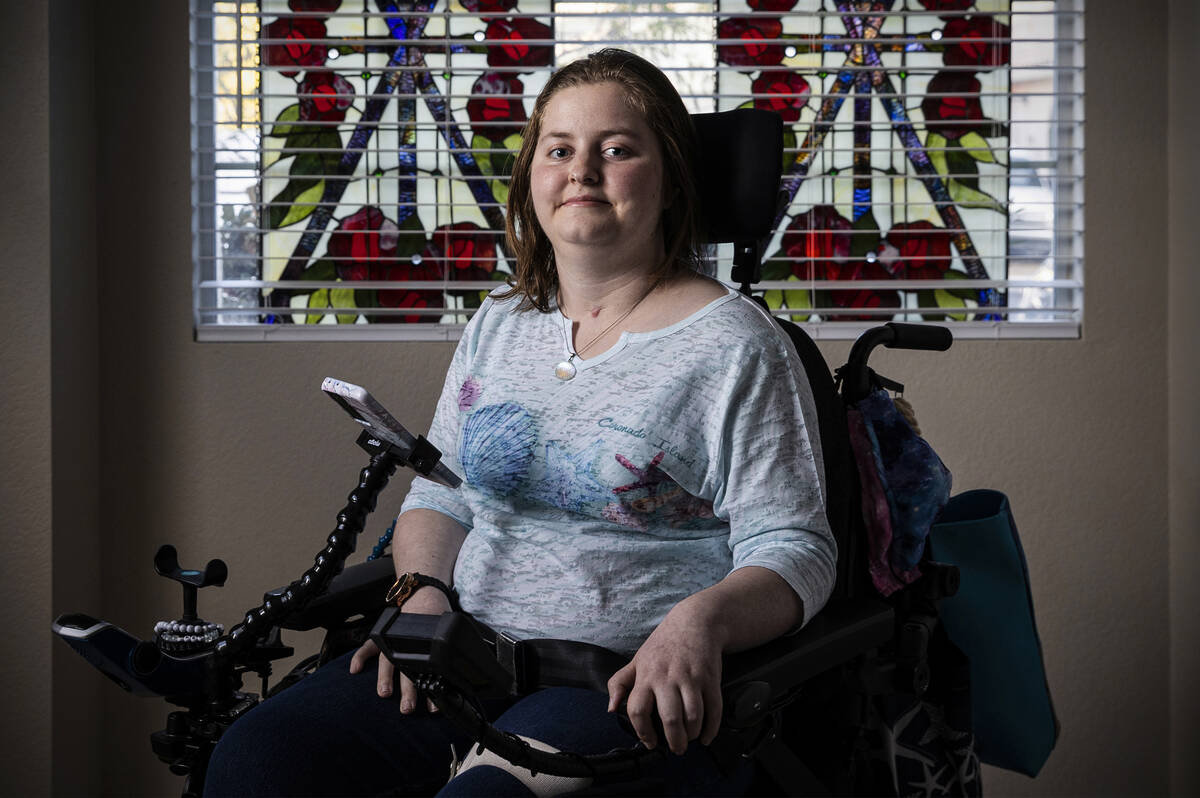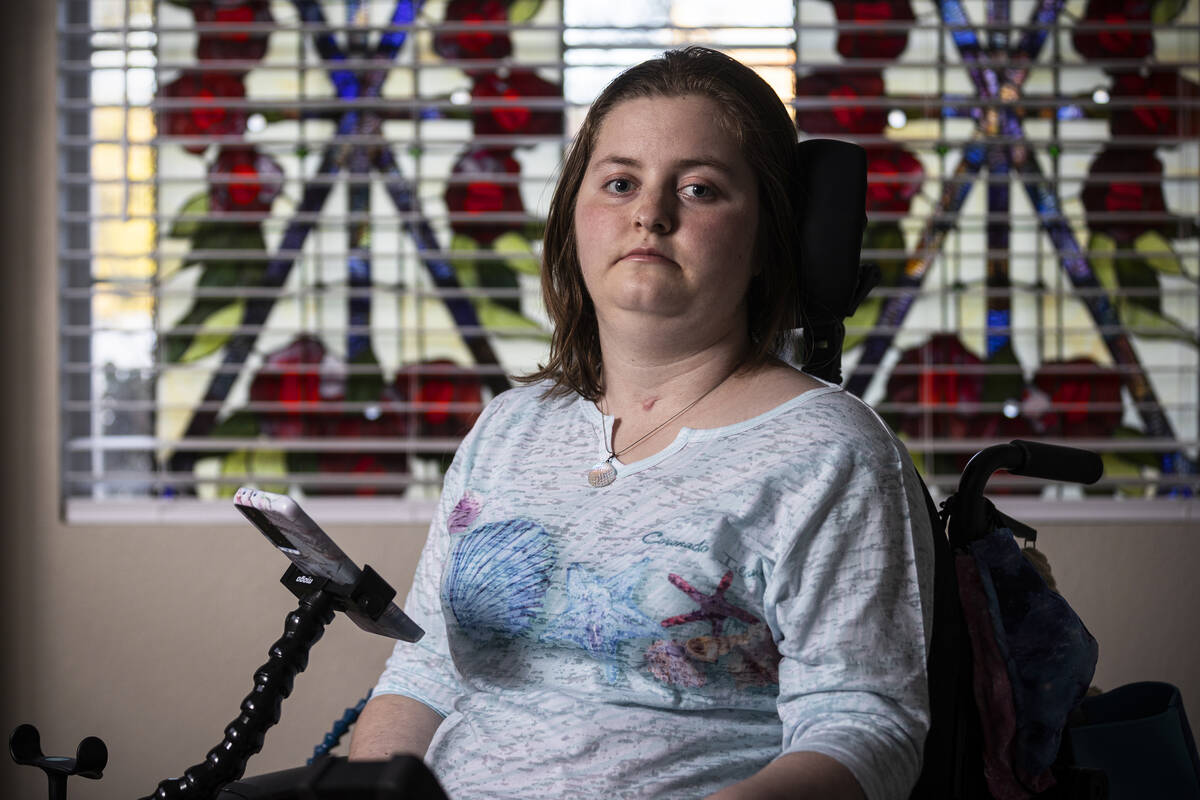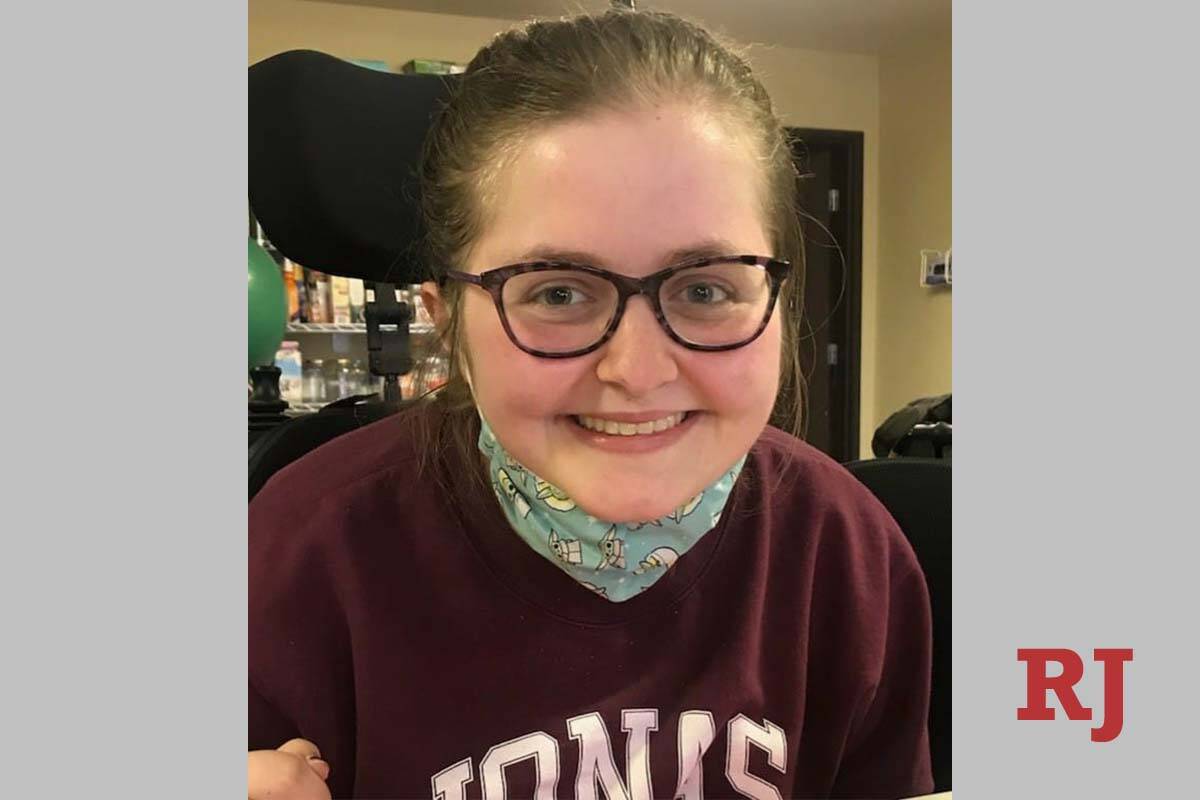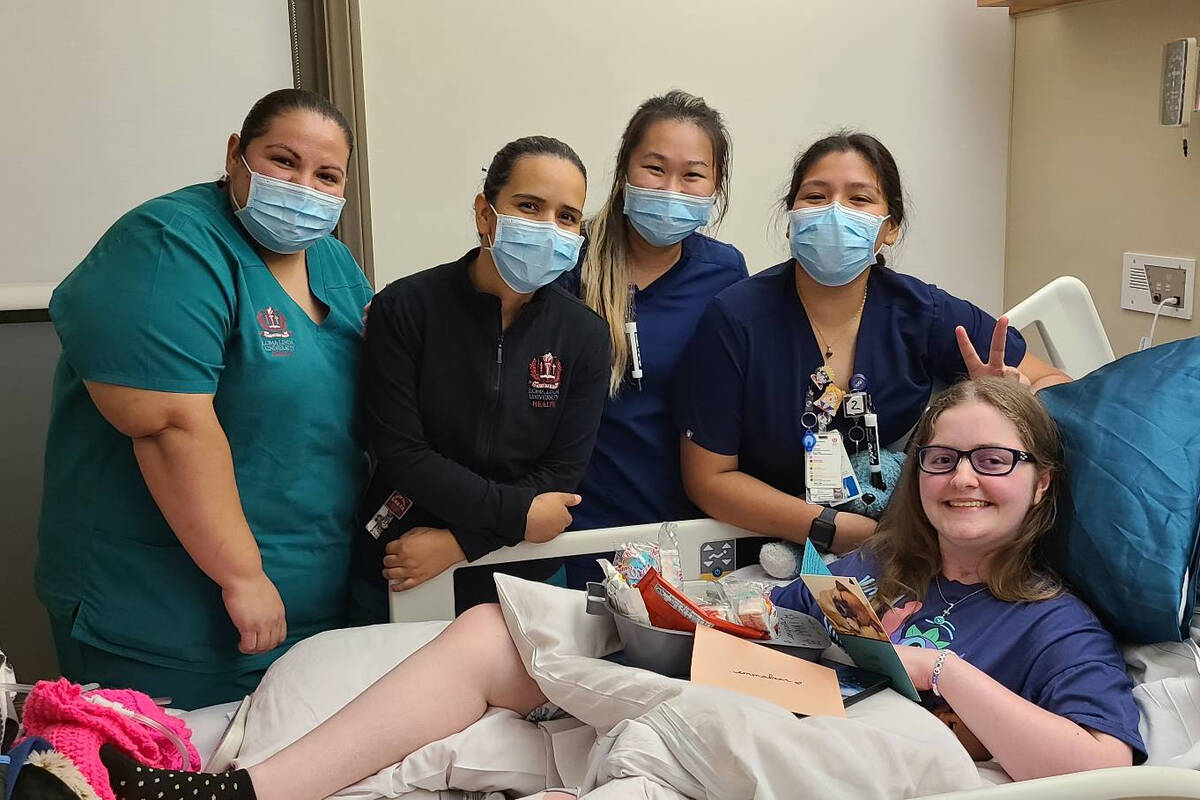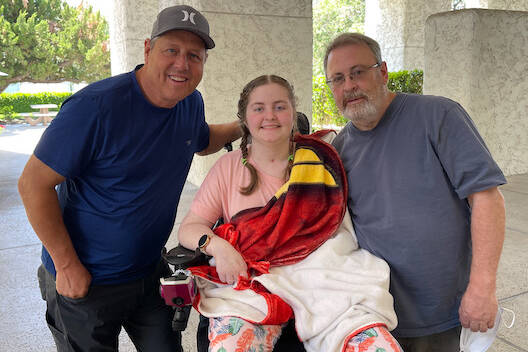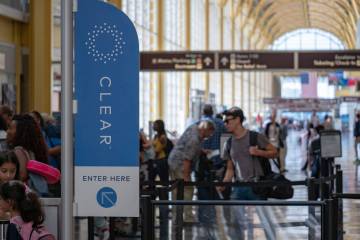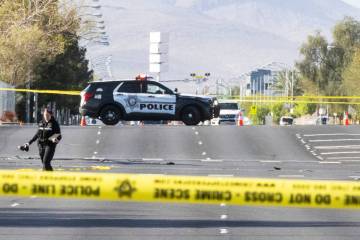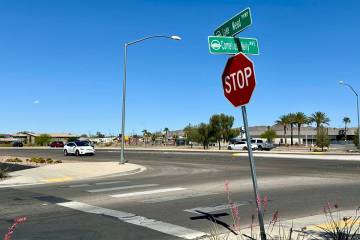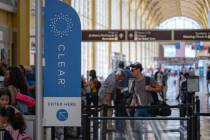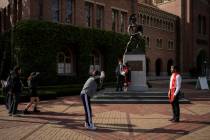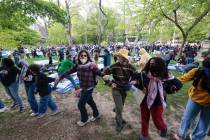Las Vegas teen relearning to walk after rare vaccine reaction
Emma Burkey, who suffered a devastating brain injury after receiving the Johnson & Johnson COVID-19 vaccine, spends most of her waking hours trying to get better.
The 19-year-old Las Vegan spends five hours or more most days undergoing therapy to relearn to walk and to improve fine motor skills in her hands, function lost after a series of strokes caused by a blood clot in her brain.
Burkey has come a long way. When she first came out of a medically induced coma, she could not speak, move or even blink her eyes.
“At the very beginning, when I was at the hospital, I couldn’t move literally anything,” Burkey recalled on Wednesday. “And my parents didn’t know that I was even there, that I wasn’t a vegetable, until I stuck my tongue out” as a way to answer yes or no questions.
Now, 10½ months after she was hospitalized on March 30, Burkey’s mind and speech are clear, her sly sense of humor intact. The function in her hands has improved to where she can eat a sandwich but not to the point that she can type.
Much of her therapy is focused on regaining her ability to walk. With the aid of a special cane and a heavy leg brace, she was able to walk a record 288 steps during a therapy session Wednesday.
“It’s not the prettiest thing you’ve ever seen,” she said about walking with the use of a cane or a walker. “But I can do it. So, I’d rather be able to do it without those things.”
Yet walking is not her top priority. What she wants most is to be able to hold a baby again.
“There’s nothing like being able to hold a baby. But I want to walk — just so that’s clear,” she said with a laugh.
Risk of a rare reaction
Before she became ill, Burkey, who was in her senior year of high school, volunteered in her church’s nursery and also worked as a nanny. Because she worked with babies and children, who weren’t eligible to be vaccinated against COVID-19, she wanted to get immunized herself as a way to protect them from the virus.
Days after getting a shot of the single-dose vaccine on March 20, she was nauseated and vomiting, symptoms she thought were a harmless side effect of the vaccine. After a severe headache followed by a seizure, her parents took her to the hospital.
Doctors there found a blood clot in her brain, as well as low platelets, which are the blood cells that help form clots. The medical team at St. Rose Dominican Hospital, Siena campus, suspected that her condition was a rare reaction to the vaccine.
The condition — thrombosis with thrombocytopenia syndrome, or TTS — had not yet been linked to the J&J vaccine. But it had been connected to a similar COVID-19 vaccine by AstraZeneca in use in other countries.
Dr. Brian Lipman told the Review-Journal in May that the hospital’s medical team urgently sought guidance from the Centers for Disease Control and Prevention, the Food and Drug Administration and Johnson & Johnson on how to treat their young patient for a condition that they had never seen before and that had not been reported in the U.S. They also wanted regulators to issue a warning, so convinced were they that Burkey was experiencing an adverse vaccine reaction.
Lipman said the team heard back from the CDC more than a week after Burkey was admitted to the hospital and the day before federal regulators called for a pause on the vaccine’s use. Her case was one of six that prompted federal regulators in mid-April to suspend the use of the J&J vaccine pending further review.
The suspension was lifted 10 days later, after regulators determined that the vaccine’s benefits outweighed its risks.
“But when you’re the risk, it’s a lot different experience,” said Burkey, who underwent three brain surgeries.
As more data on the vaccine emerged, the CDC took the unusual step in December of recommending the Moderna and Pfizer-BioNTech vaccines over the Johnson & Johnson vaccine. Until that point, health regulators had treated the three vaccines as equal, emphasizing that all provide strong protection against COVID-19.
“In most situations, Pfizer-BioNTech or Moderna COVID-19 vaccines are preferred over the J&J/Janssen COVID-19 vaccine for primary and booster vaccination due to the risk of serious adverse events,” the CDC states on its website.
As of Feb. 3, more than 18.2 million doses of the J&J/Janssen COVID-19 vaccine had been given in the U.S., according to the CDC. Regulators have identified 57 confirmed reports of people who received the vaccine and later developed TTS and nine deaths caused or directly attributed to the condition.
“Women ages 30-49 years, especially, should be aware of the increased risk of this rare adverse event,” the CDC said.
Burkey would like to see the J&J vaccine taken off the market. While not opposed to COVID-19 vaccination, she believes that it should not be mandated and that any risks must be made clear.
Defying the odds
After several days at the Henderson hospital, Burkey was airlifted in April to a hospital in Loma Linda, California, for more specialized care. Her parents, Kathy and Russ, stayed in Loma Linda while their daughter was in the hospital and as she underwent intensive rehabilitation there. The three returned to Las Vegas in July.
At each stage in her recovery, Burkey has defied the odds, first by surviving, then by relatively short stays in the hospital and a rehab facility, and now by her ongoing improvement.
She hopes to resume her plans to go to college, where she had wanted to study early childhood development. She now hopes to improve to where she could work as pediatric physical therapist.
Throughout her grueling ordeal, Burkey said she has been sustained by her Christian faith and by the support of her parents.
The family sold their house to rent a single-story home better suited for a wheelchair and soon will be moving again, Kathy Burkey said. Emma’s medical bills alone have come to $2.5 million to $3 million. The family has medical insurance, but many costs aren’t covered, including those for supplemental therapy, certain medical equipment and wheelchair maintenance.
The family does not expect to receive compensation for Emma’s injuries after a lawyer dropped their case. The Public Readiness and Emergency Preparedness Act shields vaccine manufacturers from liability in public health emergencies.
“We’re never going to retire,” said Kathy Burkey, who is part owner of a carpentry business while her husband is a day trader. The couple, who also have a son in college, are in their mid-50s.
The mother worries about the ongoing care her daughter will need and how she will manage without her parents.
“We’re not going to be here forever,” she said.
Contact Mary Hynes at mhynes@reviewjournal.com or 702-383-0336. Follow @MaryHynes1 on Twitter.
How to help
Contributions to help pay for Emma Burkey's medical care can be made to a GoFundMe account in Kathy Burkey's name. The campaign has raised more than $71,000 as of Sunday morning.



